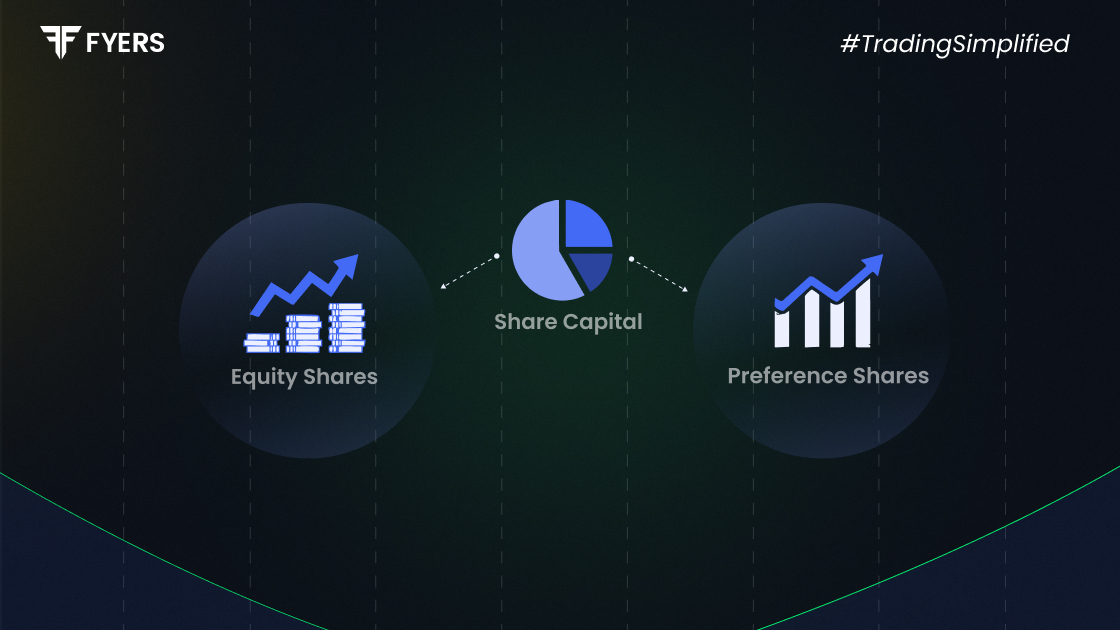

 31 Jul, 2025
31 Jul, 2025
 4 mins read
4 mins read

When a company is formed or plans to expand, one of the primary ways it raises money is through share capital. This money raised by issuing shares plays a key role in funding operations, growth, and innovation. Understanding share capital and its various forms can help investors, business owners, and students get a clearer picture of how companies are financed.
Share capital is the money a company raises by issuing shares to investors. It represents ownership in a company. When someone buys a share, they become a part-owner of the business to the extent of their shareholding.
This capital is used to finance the company’s activities, including purchasing assets, paying off debts, or funding expansion. Share capital is recorded on the balance sheet under the equity section.
There are different stages or types of share capital, depending on the company's life cycle and legal classification.
Formula
|
Share Capital = Number of Shares × Face Value per Share Total Capital Raised = Issue Price × Number of Shares |
Here are the main types of share capital:
Authorised Share Capital: The maximum amount of share capital a company is legally allowed to issue, as stated in its Memorandum of Association.
Issued Share Capital: The portion of authorised capital that has actually been issued to shareholders.
Subscribed Share Capital: The part of issued capital that investors have agreed to buy.
Called-Up Share Capital: The amount that the company has requested from shareholders out of the subscribed capital.
Paid-Up Share Capital: The actual amount paid by shareholders. In most cases, called-up and paid-up capital are the same.
Equity Share Capital: Capital raised by issuing equity shares, which carry voting rights and dividends.
Preference Share Capital: Capital raised through preference shares, which usually offer fixed dividends and priority over equity shares in case of winding up.
Regulatory Context
Governed by the Companies Act, 2013.
Public issues and preferential allotments follow SEBI ICDR Regulations.
Minimum required share capital: ₹1 lakh for private companies, ₹5 lakh for public companies.
Share capital is important for several reasons:
Initial Funding: It allows businesses to start operations without borrowing.
No Repayment Obligation: Unlike loans, share capital doesn’t need to be repaid.
Enhances Creditworthiness: A company with healthy issued share capital may find it easier to get loans or attract partners.
Ownership and Control: It helps determine ownership structure. More shares often mean more control.
Supports Growth: Companies can raise more equity share capital to fund expansion.
Legal Requirement: Private and public companies must have a minimum share capital to register.
Here’s a comparison of equity share capital and preference share capital
|
Feature |
Equity Share Capital |
Preference Share Capital |
|---|---|---|
|
Voting Rights |
Yes |
Usually No |
|
Dividend |
Variable, not guaranteed |
Fixed, priority over equity |
|
Risk |
Higher |
Lower |
|
Return |
Potentially higher |
Usually fixed |
|
Claim on Assets |
After preference shares |
Before equity shareholders |
Equity vs preference shares cater to different investor profiles such as growth seekers vs income seekers.
Here are some practical share capital examples
A company is authorised to issue 1,00,000 shares at ₹10 each. So, its authorised share capital is ₹1,000,000.
It issues 80,000 shares to the public, making its issued share capital ₹800,000.
If investors agree to purchase all 80,000 shares, the subscribed share capital is also ₹800,000.
If the company asks for ₹5 per share initially, the called-up capital is ₹400,000.
If all shareholders pay up, the paid-up capital is also ₹400,000.
Companies may need to raise more share capital over time. Here are a few ways of increasing share capital:
Issuing New Shares: Companies can issue more equity or preference shares, subject to board and shareholder approval.
Rights Issue: Offering existing shareholders the option to buy more shares at a discounted price.
Private Placement: Selling shares to select investors rather than the general public.
Bonus Shares: Issuing free shares to existing shareholders from the company's reserves.
Convertible Debentures: Loans that convert into shares at a later date.
All capital-raising methods must comply with SEBI norms and be approved by shareholders and the board.
Share capital is a foundational aspect of a company’s financial structure. It represents ownership, funds growth, and supports the company in multiple ways without the pressure of repayment. By understanding the types of share capital and their functions, businesses can make informed decisions about financing, while investors can better assess where to put their money.
It is the money a company raises by selling shares to investors, giving them partial ownership in return.
The key types include authorised, issued share capital, subscribed, called-up, paid-up, equity share capital, and preference share capital.
It provides funds without repayment obligations, supports expansion, improves credit profile, and allows companies to attract investors
Calculate your Net P&L after deducting all the charges like Tax, Brokerage, etc.
Find your required margin.
Calculate the average price you paid for a stock and determine your total cost.
Estimate your investment growth. Calculate potential returns on one-time investments.
Forecast your investment returns. Understand potential growth with regular contributions.